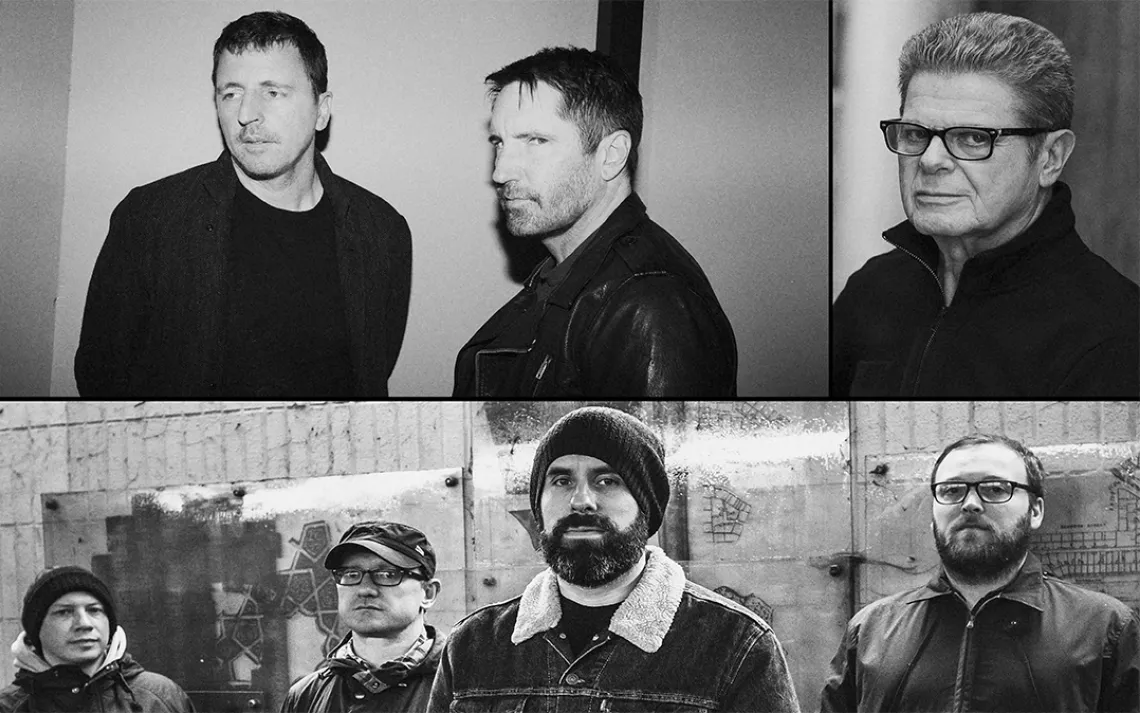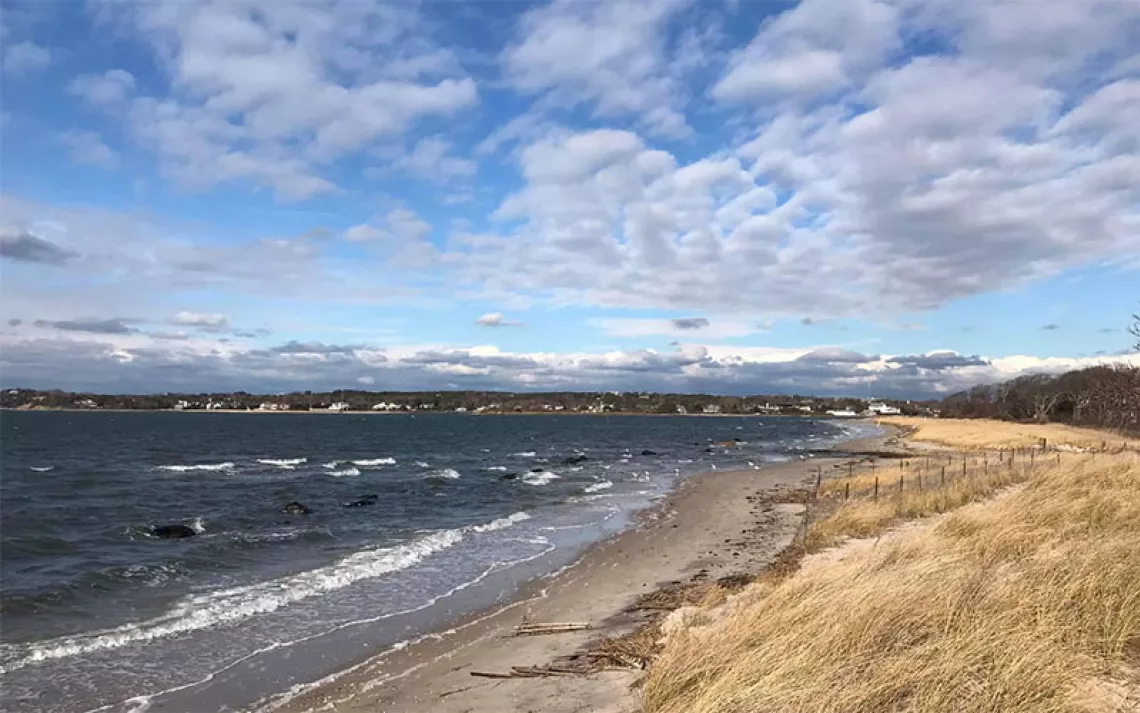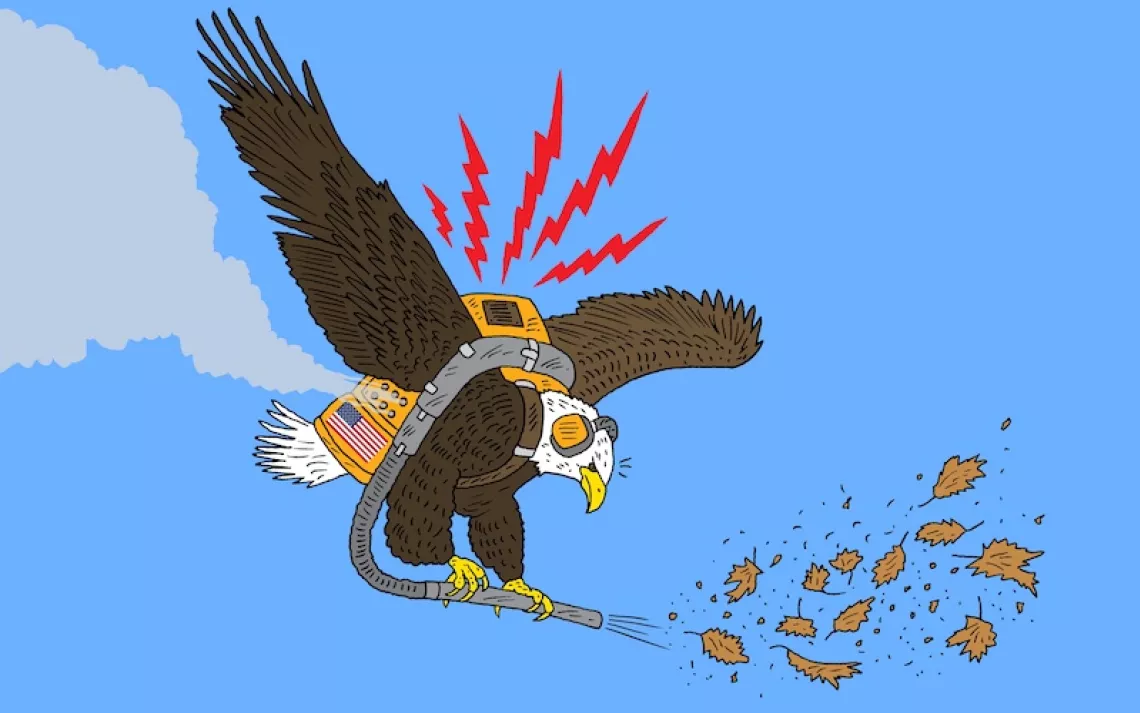Musician and Composer Trent Reznor Talks About "Before the Flood"
The Nine Inch Nails mastermind and Atticus Ross assembled a team of musicians to score Leonardo DiCaprio’s new climate change documentary

The Before the Flood composers, clockwise from top: Trent Reznor with Atticus Ross, Gustavo Santaolalla, Mogwai. Photos courtesy of Silva Artist Management.
The new eco-documentary film Before the Flood is one of the most compelling examinations to date of the challenges we face from climate change. The power of the film is due in no small part to its evocative musical score—the result of a unique collaboration between Trent Reznor, Atticus Ross, Gustavo Santaolalla, and Mogwai. At times beautifully elegant, at others darkly layered with textures of piano, acoustic guitar, and sonic distortion, the music forms a narrative backdrop to the film’s call to action and the personal-discovery story of its narrator, Leonardo DiCaprio. (Check out Sierra's complete review of Before the Flood.)
Reznor is well known as the musical engine behind Nine Inch Nails, but he has produced and written music for, and scored the soundtracks to, film for years, including Oliver Stone’s Natural Born Killers (1994) and David Lynch’s Lost Highway (1997). Recently, he worked with his writing partner Atticus Ross to create the soundtracks to David Fincher’s The Social Network (2010), which won an Academy Award for Best Original Score, The Girl With the Dragon Tattoo (2011), and Gone Girl (2014).
I spoke by phone with Reznor from his studio in Los Angeles.
— Jonathan Hahn
What convinced you to take on the project of scoring Before the Flood?
My writing partner and collaborator Atticus Ross [and I] had been apart for a couple of years because I was on tour and doing some other things. We committed to working together over the next few years on a variety of things. When we started talking several months ago, he mentioned that he’d met Fisher [Stevens] and had seen a very early cut of the film and was excited about it. I have great respect for Fisher, and also feel a civic duty to do anything I can, which seems absurd, to try to help spread the word about the facts and science of climate change. The subject matter was interesting to me and something I cared about. Then I saw an early cut of the film, and we decided to get involved.
You put together a unique scoring team for this project, involving a collaboration with Atticus Ross, Gustavo Santaolalla, and Mogwai. How did you go about composing the music together?
A decision that Atticus made early on, that we expanded upon, was to try scoring it by splitting it up between different people who we liked. He had reached out to Mogwai to contribute, and I suggested Gustavo. We all kind of had this circular sharing of information: Let’s try to compose music for this film. Let’s be open about what we’re up to. Remotely, not all of us sitting in the same room, we decided to collaborate in a way that felt unusual and ended up being very rewarding to us.
As we were writing pieces, we’d share them with the other groups. It was very open: If there’s anything in here you like, expand upon it, or recycle it, or cover it, or ignore it. It made the project manageable, where we all had smaller roles to play and less ground to cover. But it was inspiring, because we would hear what the others are doing. We took a Mogwai piece and decided, hey, let’s just do a cover of it—it wasn’t finished yet—let’s do our own version of this and send it back to them before they finish their version. Then they contributed back. There was no ego involved.
The score to Before the Flood is very much a character in the film, with its own narrative and arc.
I think the end result, which is what we were hoping to achieve with the film, is the narrative of music, and the language of the total world that we delved into, felt like a cohesive vision. It didn’t feel like a mixtape of found tracks. It was really fun to work on.
I’ve been in projects where things feel like you’re kind of grinding against them, and this is one where everything felt like it was falling into place. And it was exciting, because there was not enough time, everything was compressed, and there was an urgency to get everything finished. But it was a really fun project to be involved in, and one that I think is important, and one that Atticus and I are very proud to have worked on.
Was it clear to you what Fisher Stevens and Leonardo DiCaprio were after with this film? It’s not just about the facts of climate change. The story is as much about DiCaprio’s character arc, from being deeply skeptical that anything can be done to reverse climate change to eventually landing on a moment of optimism, when Piers Sellers, a NASA scientist facing terminal cancer, delivers the message of hope he’s been looking for. The music closely tracks that story. Was that story clear to you from the start such that you tried to respond to it musically, or did you discover it along the way?
I give all credit where it’s due to Fisher, who was a great shepherd of this project. He was very articulate through the process that the audience we’re aiming for is a mainstream audience, that we’re capitalizing on Leo’s popularity, and we’re introducing a personal narrative where it is Leo’s journey of discovery. We want you to leave the theater feeling concerned, but with a sense of hope. This isn’t about the end of the world. There’s still time to enact change and awareness on a personal level as to how you can proactively get involved to change things politically. He was very articulate about stressing that throughout.
In the first wave of music, we all worked independently and we all worked from a sense of instinct. We worked on producing music that we all felt like it belonged without worrying about where it would land, what scene it was for. Then about halfway through the process, when we were very much about what fits where, there was a lot of modification and change. The NASA scene you mentioned in particular was one we scored specifically to that. By the time we got to that, which was toward the end, we had a clear understanding of what the film felt like with our music, and the journey, and where it needed to arrive to deliver that really important moment.
I had a great experience a week or so ago when we had a screening here at Fox. I took my wife, who had seen a little bit of an earlier cut. We were sitting in the theater, and it’s a different experience for people who haven’t lived with it, you know? I find that when I finish an album, for example, I struggle with any sort of objectivity, because I’ve heard it a million times and I’m insecure. When you listen to it with a friend, it becomes very clear where it’s weak and where it’s great. It was the same experience with this film, sitting in the theater. When it got to that scene [with Piers Sellers] I looked over at her and there were tears rolling down her face. I felt the same way, and the audience felt that way, you know.
Yeah.
It was validation, to me, that we as filmmakers had succeeded in doing something that was important here—presenting this issue in a way that feels human, that doesn’t feel confrontational necessarily, and encourages one to consider what they can do to help out here, and be aware.
The song that closes the film, "A Minute to Breathe," is very much channeling that same kind of emotion. It’s jarringly beautiful and vulnerable at the same time.
That was written specifically for the film. About a third of the way through the compositional process for scoring the film, it started as kind of a private challenge to see if I could write a song with lyrics that would fit this in the right kind of way, that is not overly direct, or ridiculously on point—that could tie in in a way that feels authentic, that could live on its own as a piece of music but fits well in the context of this film. I’ve written some music for films in the past, pop songs that fit in the general theme of what the music is about, back in the '90s when there were compilation soundtrack records. But this felt a lot more naked. Atticus and I spent a few weeks on it. We hadn’t collaborated on vocal music since the last Nine Inch Nails record. It was uncomfortable. I was singing in a register I had never sung in before. There was nowhere really to hide.
I didn’t mention to Fisher that I was doing it because I figured if it ends up sucking no one needs to know we even tried. But we ended up feeling pretty good about it and told him, hey, we’ve written a song and at your discretion, if you think it’ll fit somewhere, we’d be proud to have it involved, and it worked out the way it did.
There’s some shared currents between the music for Before the Flood and [the Nine Inch Nails album] Year Zero. Year Zero is also a compositional piece of music tracking a narrative arc, where the songs are linked and structured like chapters, in a literary way. Did the making of that album lay a bit of a foundation for your work on this project?
The lesson I was learning at that stage of my life while making Year Zero was trying to write from a position that wasn’t completely about what's in my head before I go to sleep at night. It was attempting to deal with a narrative and characters. That record was heavily influenced by the Bush-era madness. The kind of working structure of the album was that, I was trying to imagine what life would be like for someone in the future, and write songs like snapshots from that future, without it coming off as too heavy-handed or corny. But it was interesting to write from a character’s point of view, that wasn’t directly myself, from my own personal, immediate experience.
Some of the lessons I’ve learned from that, as I’ve gotten into film scoring, have kind of connected, where what’s interesting about any project is the storyline, the narrative, the subject matter. I’ve really just tried to absorb myself into the project, to initially write from a subconscious place: What feels like it would belong in this? What’s the right color palette?
The lessons learned from Year Zero? The scenery has changed. I wouldn’t say for the better, considering what’s going on politically right now in this country.
 The Magazine of The Sierra Club
The Magazine of The Sierra Club






